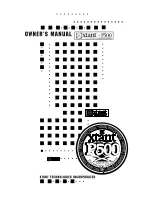
12
Appendix A: Service Information
Warranty Service
Details concerning Warranty Service are spelled
out in the Warranty section on page 19.
If you think your T•231 has a problem, please do
everything you can to confi rm it before calling for
service. Doing so might save you from the deprivation
of your equalizer and the associated suffering.
These may sound obvious to you, but here are
some things you can check. Read on.
Troubleshooting
No Power
• Our favorite question: Is it plugged in? Make sure
the AC outlet is live (check with a tester or lamp).
• Our next favorite question: Is the POWER switch
on? If not, try turning it on.
• Is the red LED above to the POWER switch
illuminated? If not, make sure the AC outlet is live.
If so, refer to “No Sound” below.
• Is the fuse blown? If the POWER LED on the front
panel is not illuminated and you are certain that
the AC outlet is live, if is possible the fuse has blown.
To remove and replace the fuse:
1.
Disconnect the line cord from the IEC socket.
2.
Remove the fuse drawer by prying it open with a
small screwdriver. It will slide all the way out.
FUSE
3.
Remove the fuse and replace it with an
equivalent-type fuse:
315 milliamp slo-blo (T315 A/250 V)
Note:
The same fuse is used for both 115 VAC and
230 VAC operation.
4.
Replace the fuse drawer by pushing it all the way
back into the IEC socket.
5.
Reconnect the line cord and turn the POWER
switch on.
If two fuses blow in a row, then something is wrong.
See the “Repair” section on the next page to fi nd
out what to do.
No Sound
• Is the signal source turned up? Make sure the
signal level from the mixing console (or whatever
device immediately precedes the T•231) is high
enough to produce sound through the system.
• Are you using the T•231 with an insert plug in an
insert jack? Make sure that you are using an insert
cable, and not a mono Y-cable.
Poor sound
• Is it loud and distorted? Turn down the signal
coming from the mixer or signal source.
• Is the input connector plugged completely into
the jack? Make sure all connections are good and
sound.
• Switch the BYPASS switch in and out to compare
the sound with the equalizer in the signal path and
out of the signal path. This can help determine if
the problem is with the T•231 or elsewhere in the
system.
Noise/Hum
• Check the signal cable between the mixer and
the T•231. Make sure all connections are good
and sound.
• Make sure the signal cable is not routed near AC
cables, power transformers, or other EMI-inducing
devices.
• Is there a light dimmer or other SCR-based device
on the same AC circuit as the T•231? Use an AC
line fi lter, or plug the T•231 into a different AC
circuit.
Summary of Contents for Tweeq
Page 20: ...tapcogear com...






































